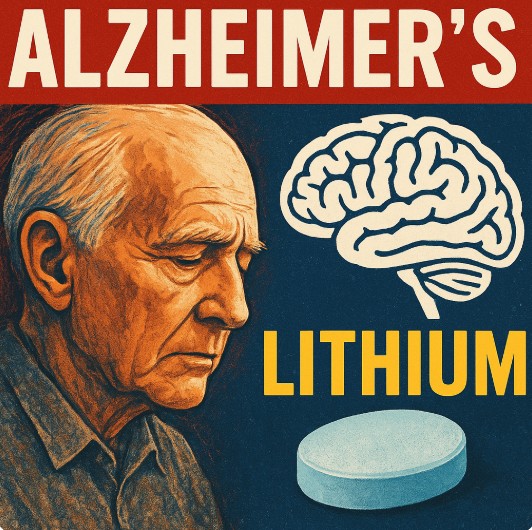
Wellness – Lithium and Alzheimer’s disease
Can wellness be as simple as a lifestyle change?
Wellness is defined as – “The quality or state of being healthy in body and mind, especially as the result of deliberate effort.”
There is no simple way to undo multiple years of misuse of our bodies. Failure to adopt a lifestyle change results in returning to your old habits!
Wellness: Lithium and Alzheimer’s Disease
Understanding the Connection
Alzheimer’s disease is the most common form of dementia, marked by memory loss, confusion, and a steady decline in daily functioning. While there is no cure, researchers continue to explore promising ways to slow its progression. One surprising candidate is lithium—a mineral best known for its use in mood disorder treatment.
What is Lithium?
Lithium is a naturally occurring trace element. In high, prescription-level doses, it has been used for decades in mental health care. However, at very low doses (sometimes called microdoses), lithium may play an important role in brain wellness and resilience.
How Lithium May Help the Brain
Emerging studies suggest lithium has neuroprotective properties that could support brain health and slow Alzheimer’s progression. Here’s how it may work:
- 🧠 Reduces Toxic Protein Buildup
Helps limit beta-amyloid plaques and tau tangles, two hallmarks of Alzheimer’s. - 🌱 Supports Brain Cell Growth & Repair
Encourages neurogenesis (new brain cells) and protects neurons. - 🔄 Balances Brain Signaling
Regulates enzymes like GSK-3β that are linked to Alzheimer’s development. - 🔥 Calms Inflammation
Lowers chronic brain inflammation, a factor in memory decline.
Microdosing vs. Prescription Lithium
- Prescription doses (for mood disorders) require strict medical monitoring due to potential kidney and thyroid effects.
- Microdoses—tiny amounts found naturally in drinking water or low-dose supplements—appear much safer and may be enough to benefit the brain without side effects.
Wellness Takeaway
Lithium is not yet an approved treatment for Alzheimer’s disease, but early research shows exciting promise. For now, it is best seen as part of a holistic brain wellness plan, alongside:
- 🥦 Healthy nutrition
- 🏃 Regular exercise
- 💤 Quality sleep
- 🧩 Mental stimulation
- 🤝 Social connection
Looking Ahead
As research grows, low-dose lithium could become a valuable tool in protecting brain health and possibly slowing dementia. Until then, focusing on overall wellness remains the most reliable way to support memory and cognitive vitality.
✨ Key Insight: Lithium, in microdoses, may offer protection for the brain and could one day play a role in Alzheimer’s prevention and care.
Taking some healthy cooking classes will teach you how to make healthy foods at home? Perhaps a Chef LeeZ cooking class.
You can see our related videos and blogs by the following links.
Our related YouTube shorts,
Our related YouTube Videos
You can see all our wellness related blogs here.
To never miss our future postings sign up to receive our newsletter by the short form below.




